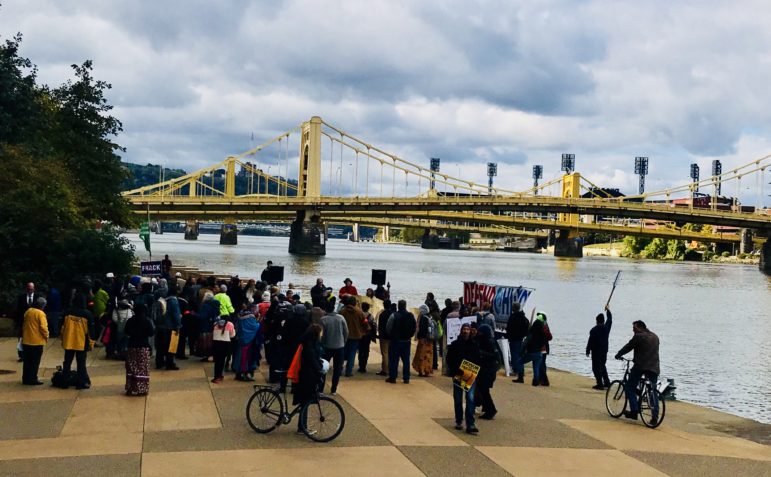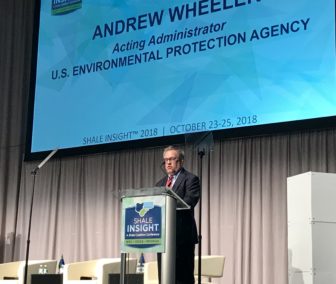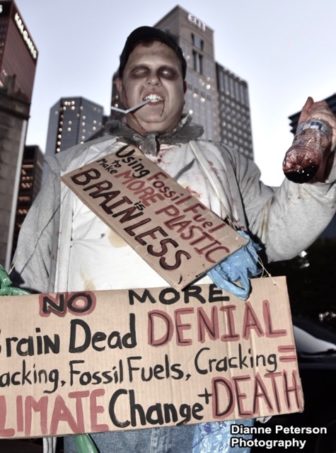Last week, Environmental Protection Agency (EPA) Acting Administrator Andrew Wheeler visited Pittsburgh, Pennsylvania–the first city in the world to ban the practice of fracking, in a state second only to Texas for its production of shale gas. But Mr. Wheeler didn’t come here to talk about issues central to his agency’s mission, like protecting the health of the 12.6 million Americans living within ½ mile of over one million oil and gas facilities and addressing the industry’s massive contribution to climate change.
Instead, Mr. Wheeler promised a crowd of enthusiastic industry reps at the annual Shale Insight conference that he intends to loosen environmental and health safeguards to pad their bottom line.
In his keynote address, Wheeler lauded the 28 deregulatory actions the EPA has taken since President Trump took office, and dozens more already in the works. He promoted the EPA’s proposed “self-audit program” that would make new operators of notoriously dirty facilities the proverbial foxes guarding the henhouse. He informed the crowd that the EPA would shift its focus away from overseeing polluting industries like oil and gas, and narrow its work to only the areas of the US that currently don’t meet basic Clean Air Act standards. He called for educating poor communities about the environmental threats they face, without acknowledging the disproportionate burden of those threats they carry because of a lack of industry oversight, or how poverty limits their ability to relocate or mitigate impacts to their health. He cited reductions in greenhouse gases, while trashing and promising to roll back the Obama-era regulations that are behind the progress. He celebrated the declining coal industry, but didn’t once mention the growth of renewables. Wheeler spoke for twenty-five minutes without ever saying the words “climate change.”
While Wheeler was inside the conference stroking the ego and whipping up the hopes of the fossil fuel industry, concerned residents–who stand to be impacted by his perversion of the EPA’s mission–gathered outside. Rallies spanning several days focused on the burgeoning petrochemical industry in Appalachia, and its massive threat to air and water quality in the Ohio River Valley and beyond. These peaceful and inventive efforts–which included a water blessing ceremony and protestors dressed as “plastics zombies”–did not go unnoticed by the conference organizers, who referred to the protests throughout their remarks. Conference organizers issued numerous safety warnings–even cautioning attendees to remove their Shale Insight badges before walking outside lest they confront a peaceful protester.

But there are bigger–and far more real–reasons why the oil and gas industry should be afraid. Wheeler’s address–and the messaging of the entire conference–blatantly puts industry interests above the health and safety of the rest of us. Since he began heading the EPA, his actions have shown where his priorities lie. Currently, Wheeler is attempting to give the industry an estimated $480 million windfall by dismantling crucial federal rules that limit methane emissions from the oil and gas industry. Methane, like carbon dioxide, is a greenhouse gas that furthers climate change. But methane is far more potent–this primary constituent of “natural” gas is 86 times more powerful than CO2 over a twenty-year period. And even Shale Insight speakers admitted that their industry is responsible for a massive 25% of US methane emissions.
We are all impacted by the air pollution, water contamination, health impacts, and climate disruption caused by the oil and gas industry, and we need strong public protections and industry accountability and oversight.
Wheeler’s address to this pro-gas conference was a harsh reminder of the current administration’s misguided and downright dangerous priorities. It’s up to us to demand that Wheeler and the EPA do their job and put people like us before fossil fuel polluters. We all must call upon Wheeler and the EPA to save the federal methane protections currently under threat.
Right: Protestors don zombie costumes and signs to show the connection between fossil fuels, petrochemicals, and plastics pollution. Photo credit: Dianne Peterson Photography


